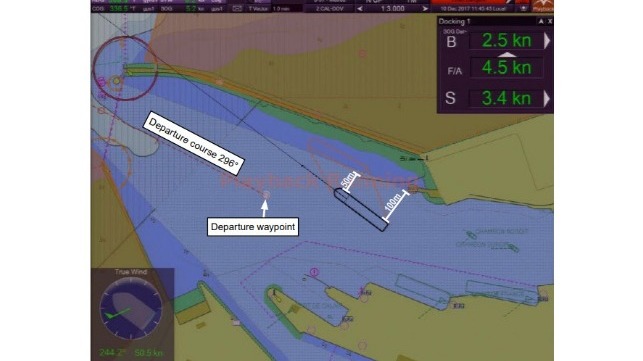Switch to Ultra-Low Sulfur Fuel a Factor in Grounding

The U.K. Marine Accident Investigation Branch has released its report into the passenger ferry Pride of Kent striking a jetty and grounding in Calais, France, in December 2017, citing a switch to low sulfur fuel as a contributing factor.
On December 10, 2017, the U.K. registered Pride of Kent struck a jetty and then grounded while departing Calais, France. The ferry’s starboard propeller and tail-shaft were damaged and required repair in dry dock. The jetty was also damaged, but there were no injuries and no pollution.
Control of Pride of Kent’s movement was lost after the ferry had turned off its berth to head for the harbor entrance. Factors directly contributing to the loss of control included:
• The ferry’s fast rate of turn as it passed through its intended heading.
• The loss of one of the ferry’s two bow thrusters during the turn. Fuel pump problems following a change to ultra-low sulfur fuel oil had occasionally resulted in bow thrusters tripping and reduced engine speed and shaft speeds when maneuvering.
• Lateral movement resulting from leeway induced by winds exceeding 50 knots and the thrust effect of using full port rudder with maximum propeller pitch ahead.
Other factors that had a bearing on decision-making, the bridge team’s performance and machinery reliability included:
• The master’s concern that the wind speed might increase to over 40 knots, the threshhold for having a tug available, influenced the timing of the ferry’s departure.
• The omission of a departure brief contributed to the master not being fully supported and the inexperienced helmsman not being closely supervised.
In June 2017, the fuel used on board Pride of Kent was changed from marine gas oil to ultra-low sulfur fuel oil (ULSFO) to reduce vessel running costs. Both fuel types complied with emissions requirements for ships within the North Sea Sulfur Emission Control Area.
Since the introduction of ULSFO, the main engines’ fuel pumps had suffered from increased wear, which resulted in, among other things, difficulty in starting and clutching in, the engines alarming on overload more frequently, high exhaust gas temperatures and reduced power output that resulted in speed reductions of between one and two knots when on passage.
Additionally, the main engine fuel pumps’ serviceable life was reduced by as much as five years to as little as two months. This resulted in all the main engine fuel pumps fitted on board Pride of Kent being replaced between August and November 2017. Following the introduction of ULSFO, although the bow thrusters had occasionally tripped, the cause of their failure had not been associated with the degradation of the fuel pumps.
The problems encountered following the introduction of ULSFO were reported to P&O Ferries’ technical superintendent and were reflected in the chief engineers’ end of month reports. However, the status of the main propulsion was recorded as ‘satisfactory’ in the ferry’s weekly status reports.
Investigation by the propulsion control system’s manufacturer in July 2017 indicated that the engine problems being experienced were probably linked to the performance of the fuel pumps. The performance of the fuel pumps was referred to Lloyd’s Register technical investigation department in October 2017, but resulting remedial work did not improve the situation and the associated engine problems continued.
The report is available here.
